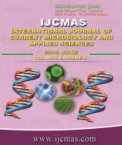


 National Academy of Agricultural Sciences (NAAS)
National Academy of Agricultural Sciences (NAAS)

|
PRINT ISSN : 2319-7692
Online ISSN : 2319-7706 Issues : 12 per year Publisher : Excellent Publishers Email : editorijcmas@gmail.com / submit@ijcmas.com Editor-in-chief: Dr.M.Prakash Index Copernicus ICV 2018: 95.39 NAAS RATING 2020: 5.38 |
The basic objective of soil testing programme is to give farmers a service leading to better and more economic use of fertilizers and soil management practices for increasing agricultural production. Now a day’s consumption of fertilizer by farmer is higher than actual requirement. The farmers do not follow the soil testing technique. Soil test based nutrient management has emerged as a key issue in efforts to increase agricultural productivity and production since optimal use of nutrients, based on soil analysis can improve crop productivity and minimize wastage of these nutrients, thus minimizing impact on environmental leading to bias through optimal production. Governments do efforts towards these through Soil Health Cards. The above study was conducted in Anantapuramu district of Andhra Pradesh. Six mandals were selected for the study. From each mandal two villages were selected and from each village 20 SHC beneficiaries were selected thus comprising 240 respondents for the study. The data were collected with help of well-structured interview schedule following personal interview methods. The data revealed that major constraints faced by SHC beneficiaries in utilizing the soil health card were, Difficulty in calculating fertilizer dose on the basis of nutrient status of soil (85.84%), receiving soil health cards after crop harvest (82.51%), time gap between soil samples taken and issuing cards is too high (79.17%), and collection of soil sample was not done in presence of farmers (72.92%).
 |
 |
 |
 |
 |